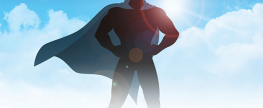
Superman and young athletes don’t do it for us anymore It was easy to have a hero when I was young. Heroes could be anyone older, wiser and more accomplished, and when you’re a kid, that could be pretty much anyone. Growing up in the 1960s, if you asked me to name those I most admired, I probably would have answered NFL quarterback Bart Starr or baseball great Mickey Mantle. If you asked me to name a hero who wasn’t a professional athlete, I probably would have come up with Charles Lindbergh. Now, however, it’s harder for me to say who my heroes are. A Different Perspective I’ve heard too much about Mickey Mantle’s off-field drinking and skirt-chasing to consider him a role model today. Something similar happened once I read about Lindbergh’s views about racial superiority and staying out of World War II. Now that I’m older and wiser, or perhaps more cynical and more attuned to feet of clay, whom can I admire today? To paraphrase Tina Turner, do I need another hero? It’s more complicated, but still possible and valuable to find a hero, even as we get older, according to Scott Allison and George Goethals. They’re a couple of University of Richmond psychologists who have written extensively about heroism in books like Heroes: What They Do and Why We Need Them. Allison said we seek out heroes because they have the potential to energize and inspire us. We also seek wisdom from our heroes, hoping they will reveal meaning, truth and purpose, according to Allison. “They help us grow and improve and heal wounds. They give us hope and they elevate us emotionally,” Allison said. Recognizing the Flaws But hero worship becomes more nuanced and...






